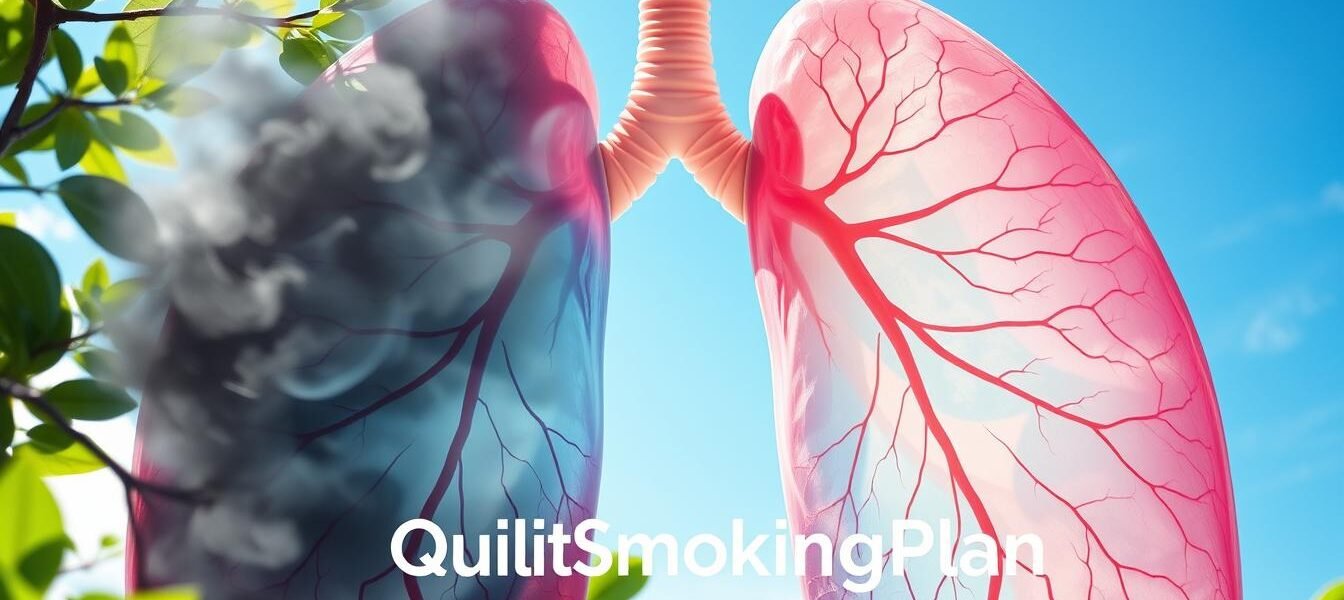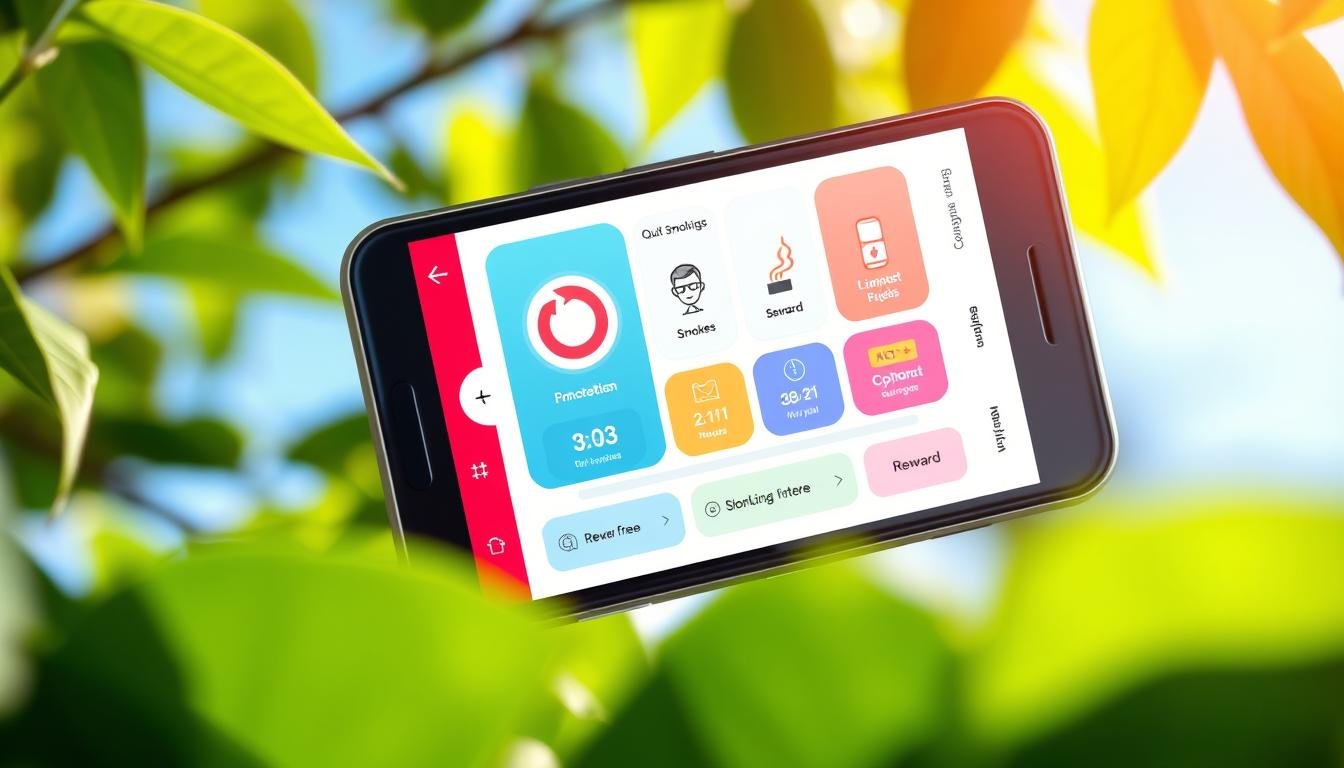“It is not the strongest of the species that survive, nor the most intelligent, but the one most responsive to change.” – Charles Darwin.
Quitting smoking is a big step towards better lung health. It starts the moment you decide to quit. Smoking harms your lungs a lot, causing diseases like COPD and raising cancer risks. But quitting brings quick benefits to your lungs.
You can greatly improve your lung health after quitting. This can also lower the risk of serious illnesses. Studies show that quitting before 40 can cut smoking-related death risks by up to 90%1. This article will look at the quick changes and long-term health gains from quitting smoking.
Your journey to better lung health is filled with amazing changes. Knowing this journey is key to enjoying the full benefits of quitting smoking.
Key Takeaways
- Quitting smoking can improve your lung health significantly.
- Immediate benefits include enhanced taste and smell, along with reduced respiratory symptoms.
- After quitting, risks for lung cancer and other diseases decrease substantially over time.
- Your lung function begins to improve within the first month of cessation.
- Patients can add up to 10 years to their life by quitting smoking.
- Ongoing support and healthy lifestyle changes are key to maintaining lung health.
Understanding the Impact of Smoking on Lung Health
Smoking severely harms lung health, causing inflammation and damage. It reduces lung function and makes you more likely to get sick. This leads to many respiratory problems.
Cigarettes contain harmful chemicals that hurt the respiratory system. They make health issues worse and raise the risk of chronic diseases. For example, lung cancer is a major killer in the U.S., showing how dangerous smoking is2.
Quitting smoking can greatly improve lung health. Lung capacity can increase by 10% in just nine months3. Even after 20 minutes without smoking, the bronchial tubes start to heal, reducing illness risk3.
After 48 hours without smoking, the lungs start to clear out mucus and debris3. By 72 hours, the bronchial tubes relax more, improving oxygen and carbon dioxide exchange. This is key for better lung function, especially as quitting for two weeks to two months can improve lung function by up to 30%3.
Knowing how smoking affects lung health is crucial. It shows why quitting is vital for your lungs and overall health.
The Benefits of Quitting Smoking for Lungs
Quitting smoking is great for your lungs. Just 12 hours after stopping, your body starts to get more oxygen45. In a few months, your lung function can improve by up to 30%4.
As time goes on, you’ll find it easier to do things because you cough less and make less mucus.
After six months, your lungs work better, and you breathe easier4. Quitting smoking also lowers your risk of heart disease and lung cancer in the long run45. The more years you stay smoke-free, the lower your risk of lung diseases46.
Quitting smoking brings many benefits that last a lifetime. It reduces health risks and improves your life quality, focusing on lung health56.
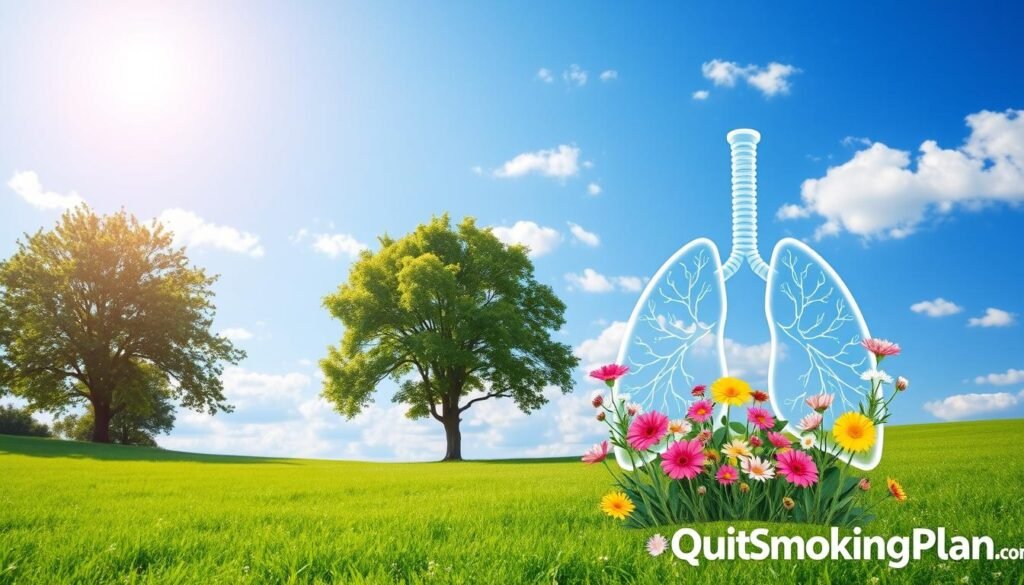
Initial Improvements in Lung Function
When you stop smoking, your body starts a healing journey. You’ll see lung function improve soon after quitting. Within 24 hours, your body’s carbon monoxide levels go back to normal, helping your body get more oxygen7. As days go by, you’ll notice big short-term changes after quitting, especially in your lungs.
Short-Term Changes After Quitting
In the first days, your lungs’ cilia start to work better. This makes it easier to get rid of mucus and other stuff. After a week, you might breathe easier because your cilia work better and you make less mucus7. In one to three months, your lung function can go up by 30%, which is a big step in your lung recovery after quitting smoking.
Long-Term Health Improvements
Quitting smoking does more than just help your lungs in the short term. Six months later, you’ll breathe better and have less inflammation, which means less shortness of breath7. Over time, your health keeps getting better. After a year, your heart disease risk halves, and your lung cancer risk drops a lot7. After five to ten years, your risk of lung diseases and COPD goes down a lot, showing how quitting smoking really helps your health.
| Timeframe | Changes in Lung Function |
|---|---|
| 24 hours | Carbon monoxide levels normalize, oxygen flow improves7 |
| 1-2 days | Cilia begin to recover, aiding in mucus clearance7 |
| 1 week | Breathing becomes easier due to enhanced cilia function7 |
| 1-3 months | Lung function can increase by up to 30%7 |
| 6 months | Mucus clearance improves, inflammation decreases7 |
| 1 year | Heart disease risk halves, lung cancer risk drops significantly7 |
| 5-10 years | Risk of lung diseases and COPD decreases significantly7 |
Lung Health After Quitting Smoking
Your lung health gets better right after you stop smoking. You’ll see improvements in just 20 minutes, with your heart rate and blood pressure getting back to normal. In one day, your risk of a heart attack starts to go down, helping your lungs work better over time8.
Staying smoke-free helps your lungs even more. In two weeks, your blood flow gets better. By three months, your lungs can work up to 30% better, making it easier to exercise9. After 3-9 months, your lung function can improve by another 10%, making you feel even better8.
Another good thing is that your airways start to heal. This means they can clear out mucus and debris better10. You might cough a lot as your lungs heal, which can last a few weeks to a year. If it lasts more than a month, or if you have pain or blood, it’s a good idea to see a doctor10.
The longer you don’t smoke, the better your lungs will get. After a year, your risk of heart attack and heart disease goes down by 50% compared to smokers. Making healthy choices like drinking water, eating well, exercising, and using remedies like guaifenesin or honey can help your lungs heal even more to support your journey.
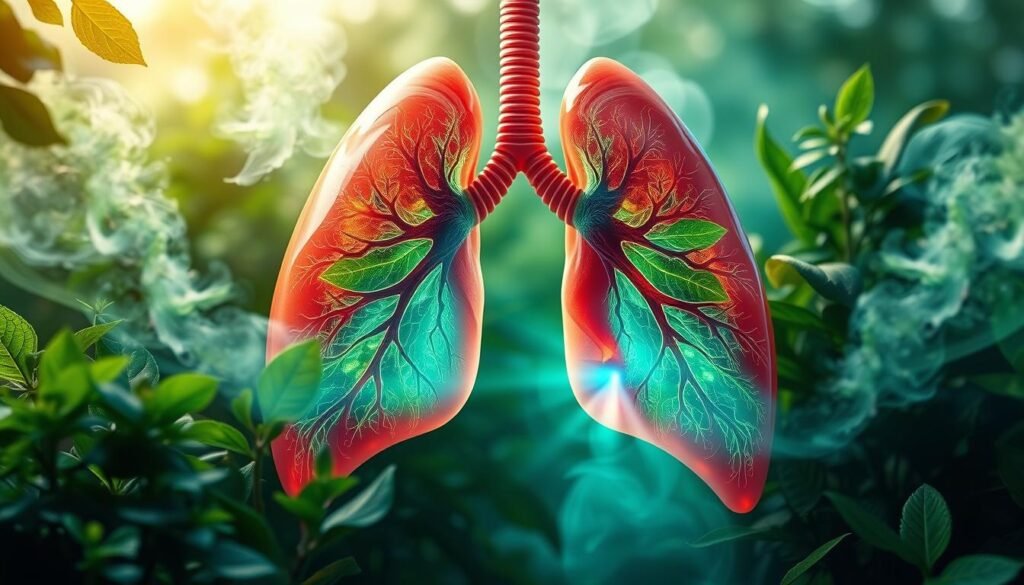
| Timeframe After Quitting | Health Benefits |
|---|---|
| 20 Minutes | Heart rate and blood pressure stabilize. |
| 1 Day | Risk of heart attack decreases. |
| 2 Weeks | Circulation improves. |
| 3 Months | Lung function increases by up to 30%. |
| 1 Year | Risk of heart attack reduces by 50%. |
The Science Behind Lung Recovery
Learning about lung recovery after quitting smoking is fascinating. Our lungs can heal amazingly well. They start fixing themselves right after you stop smoking. Studies show that even after years of smoking, lungs can regain their health.
How the Body Repairs Itself
When you quit smoking, your body starts a healing process. A study found that ex-smokers have healthier lung cells, making up about 40 percent of their lung cells11. This is key because smoking damages cells, leading to serious health issues like lung cancer11.
Even after years of smoking, lungs can still heal. Research shows that quitting can lead to new, healthy cells replacing damaged ones12. This shows how strong and resilient our lungs are.
Timeframe for Lung Recovery
The time it takes for lungs to recover varies. Some people notice improvements in breathing within weeks of quitting. Studies also show that lung function can keep getting better for years after quitting1211.
Quitting smoking greatly lowers the risk of lung cancer, leading to healthier lungs over time1211. While it may take time, the benefits of quitting are huge and life-changing.
| Time Frame After Quitting | Potential Improvements |
|---|---|
| 2 weeks | Improved circulation and reduced coughing |
| 1-3 months | Enhanced lung function and decreased shortness of breath |
| 6 months | Significant reduction in respiratory infections |
| 1-2 years | Substantial decrease in lung cancer risk |
| 5 years | Risk of heart disease is comparable to non-smokers |
| 10 years | Lung cancer risk reduced by up to 50% |
| 15 years | Risk of stroke comparable to that of non-smokers |
Recovering lung health is not just possible; it’s achievable for those who quit smoking121113.
Factors Affecting Lung Health Recovery
Recovering lung health after quitting smoking depends on many factors. Knowing these factors is key to keeping lungs healthy. Important factors include age and duration of smoking and any underlying health conditions.
Age and Duration of Smoking
Your age and how long you’ve smoked affect your lung health after quitting. Younger people or those who smoked less tend to see faster lung function improvements. On the other hand, those who smoked for longer face more recovery challenges.
Former smokers experience a faster decline in lung function compared to those who never smoked. This shows smoking’s lasting effects even after quitting14.
Underlying Health Conditions
Having underlying health conditions also affects lung health recovery. Conditions like asthma or COPD can slow down recovery. People with these diseases see different rates of improvement.
It’s crucial to get help from healthcare professionals. They can create recovery plans that address smoking cessation and any existing health issues15.
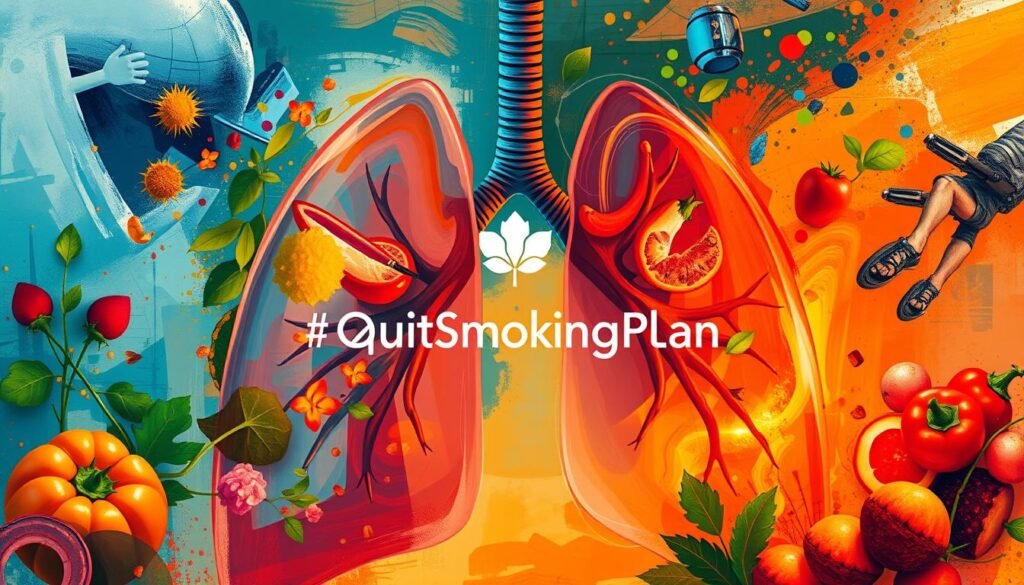
Signs Your Lung Health Is Improving
It’s important to know the signs your lung health is getting better after quitting smoking. As your body heals, you might notice changes that show your lungs are working better.
Decreased Coughing and Shortness of Breath
One of the first signs of better lung health is less decreased coughing and shortness of breath. This can start to happen in the first month after you quit. Your lungs start to work better, improving circulation and airflow16.
By six months, your lungs can clear mucus better and have less inflammation. This means you’ll breathe easier7. Studies show that lung cilia start to work normally again in nine months16.
Improved Exercise Tolerance
You’ll also notice you can do more physical activities without getting tired. This is because your lungs can hold more air17. Many people who quit smoking say they can do more without getting exhausted, which is a big sign of progress16.
Research shows that lung function can get up to 30% better in the first three months after quitting. This means you’ll have more energy and be healthier overall7.
| Time After Quitting | Improvements Noted |
|---|---|
| Within 12 Hours | Carbon monoxide levels return to normal |
| 1 Month | Lung function starts to improve |
| 6 Months | Less shortness of breath and improved mucus clearance |
| 1 Year | Risk of heart disease is halved |
| 5 Years | Reduced risk of lung-related diseases |
| 10 Years | Lung cancer risk is halved |
Keeping track of these tips for improving lung health post-smoking cessation will help you celebrate your progress17. Remember, these signs not only show your hard work but also motivate you to keep living a healthier life.
Benefits of Smoking Cessation on Overall Health
Quitting smoking brings many benefits of smoking cessation that go beyond better lung health. Your heart rate and blood pressure start to get back to normal just 20 minutes after you stop smoking18. This means your body gets rid of harmful substances faster, boosting your immune system. This helps lower your risk of getting sick with respiratory infections and other illnesses.
Smoking causes about 30% of all cancer deaths, and nearly 90% of lung cancer deaths are linked to tobacco19. Quitting smoking greatly lowers your risk of these deadly diseases. For example, quitting before 40 can cut your risk of dying from smoking-related causes by 90%19. This choice can lead to a healthier, longer life. Within one year of quitting, your risk of heart disease is cut in half20.
Quitting smoking also brings big emotional benefits. Many people feel better mentally and enjoy a better quality of life. You might notice more energy, a better mood, and less stress when facing daily challenges20. These mental gains can give you a new outlook on life.
Quitting smoking also benefits those around you. Children of smokers often get sick more often, like with asthma and colds. When you quit, these risks go down, making your home a healthier place20.
In summary, quitting smoking improves your respiratory health, heart health, mental well-being, and overall life quality. It also makes your home healthier for your loved ones. Knowing these benefits can motivate you to live a smoke-free life, making the benefits of smoking cessation truly worth it.
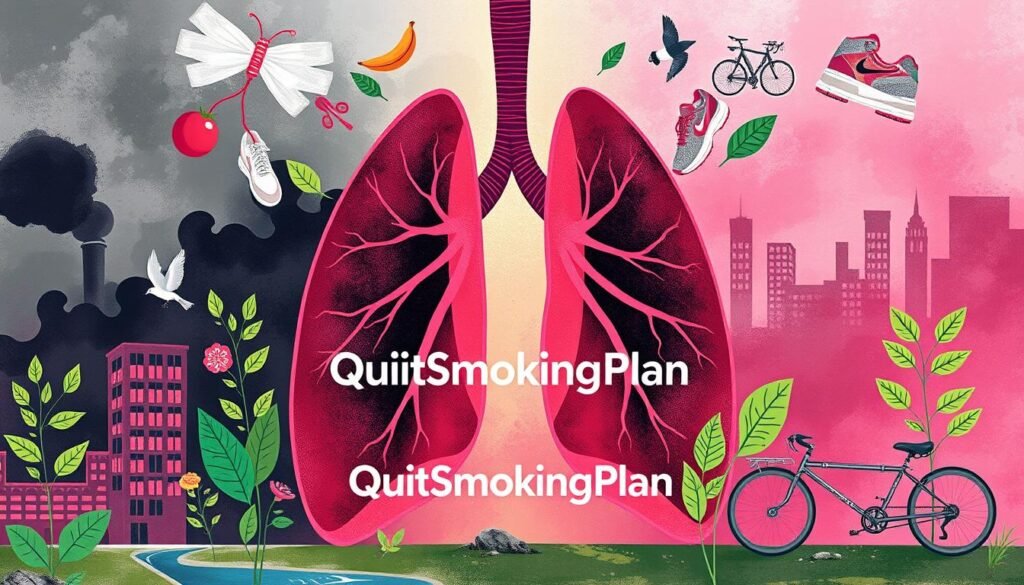
| Time Frame | Health Benefits |
|---|---|
| 20 minutes | Blood pressure and pulse return to normal |
| 12 hours | Carbon monoxide levels normalize |
| 1 year | Risk of coronary heart disease is halved |
| 5 years | Risk of various cancers reduces significantly |
| 10 years | Risk of lung cancer is approximately half that of a current smoker |
Ways to Enhance Lung Health After Quitting Smoking
Keeping your lungs healthy after quitting smoking is key to recovery. You can help your lungs heal by making smart food choices and following lung care tips. Eating foods high in antioxidants and anti-inflammatory properties is important. Adding fruits, vegetables, whole grains, and omega-3 fatty acids to your diet can greatly improve your lung health.
Importance of Nutrition
Eating well is crucial for lung health after quitting smoking. Foods rich in vitamins and minerals help remove toxins and reduce inflammation. Tips for healthy lungs suggest avoiding processed foods and eating more natural, whole foods. Drinking green tea daily can also help, as studies show it improves lung function21.
Best Practices for Lung Care
Good lung care involves making lifestyle changes. Stay indoors on polluted days and keep your air clean. Doing breathing exercises can improve lung capacity. Drinking plenty of water helps thin mucus, making it easier to breathe22.
Regular doctor visits are also important. They help catch lung problems early. Practicing controlled coughing and using steam therapy can also help by removing toxins and loosening mucus21. These methods together help keep your lungs healthy and support your recovery after quitting smoking.
The Role of Exercise in Lung Health Improvement
Regular physical activity is key for better lung health, especially after quitting tobacco. It strengthens the heart and lungs, making it easier to breathe. Activities like running, swimming, and yoga help your lungs recover and work better.

Exercise is very important for lung health after quitting tobacco. A study showed that low-intensity training boosts lung function in smokers and non-smokers23. Breathing exercises like pursed lip and belly breathing also improve lung efficiency, which is great for those with lung diseases24.
- Boosts endurance and capacity of lungs.
- Improves overall cardiovascular fitness.
- Enhances daily physical performance.
- Encourages better lung function through breathing exercises.
Mixing aerobic and strength exercises with breathing techniques helps heal lungs. A balanced program strengthens lungs and improves life quality after quitting tobacco. Using resources and programs for respiratory health can help stay active and thrive after cessation.
| Type of Exercise | Benefits for Lung Health |
|---|---|
| Aerobic exercises (Walking, Running) | Increases lung capacity and efficiency. |
| Strength training (Weight lifting, Pilates) | Enhances muscle strength and respiratory function. |
| Breathing exercises (Pursed lip, Belly breathing) | Improves lung efficiency and reduces shortness of breath. |
Starting exercise for lung health is a big step towards better health after quitting tobacco. Regular exercise makes lungs work better and boosts overall well-being.
Lung Detox After Quitting Smoking
After you stop smoking, it’s key to focus on lung detox. This helps your body get rid of toxins. Using effective detox strategies can really help.
Effective Detox Strategies
There are certain activities that can help with lung detox. Here are a few:
- Deep breathing exercises to improve lung capacity and efficiency.
- Steam therapy, which helps to hydrate the airways and loosen mucus.
- Cardiovascular activities like walking or jogging to boost circulation and lung function.
Remember, staying hydrated is very important. Drinking enough water helps thin out mucus in your lungs. This makes breathing easier and helps get rid of toxins.
Benefits of Hydration and Clean Air
Healthy lungs need more than detox strategies. The environment you live in matters a lot. Here’s why:
- Drinking enough water is good for your lungs.
- Clean air helps your body detox faster. It keeps you away from harmful pollutants.
Make sure your home is free from harmful stuff. Change appliance filters often. Keep humidity low to stop mold. And avoid secondhand smoke. These steps help your lungs heal over time.
Using these strategies is crucial. You’ll see improvements in circulation and lung function a few weeks after quitting. After a year, your lungs can clear mucus better. This lowers the chance of getting sick.
| Timeframe | Improvement |
|---|---|
| Several weeks | Circulation and lung function improve |
| One year | Cilia in lungs enhance mucus clearance |
| Ten years | Lung cancer risk reduces to half that of smokers |
| Twenty years | COPD risk drops to non-smoker levels |
| Thirty years | Lung cancer risk diminishes to nonsmoking levels |
By taking these steps, you’ll help your lungs detox after quitting smoking. This supports your lung health for the long term2526.
Maintaining Healthy Lungs After Quitting Smoking
Deciding to quit smoking is a big step. Now, it’s time to focus on long-term lifestyle changes. These changes help your lungs heal and improve your overall health. Adopting positive habits is key to keeping your lungs healthy.
Long-Term Lifestyle Changes
Here are some important lifestyle changes for lung health:
- Quit tobacco completely and avoid secondhand smoke. This helps your lungs heal faster.
- Eat a healthy diet with anti-inflammatory foods. Foods like blueberries, spinach, and almonds help reduce inflammation.
- Stay active with regular exercise. It helps restore lung function and improves breathing.
- Monitor your lung health regularly. This helps you see how well your lungs are healing.
- Drink plenty of warm fluids like tea or water. They help clear mucus from your lungs.
Quitting smoking leads to many health benefits. You’ll notice better lung function in 2 weeks to 3 months as your lungs clean themselves27. Symptoms like coughing and shortness of breath will also improve in the first year27. Sticking to these lifestyle changes helps your body recover fully.
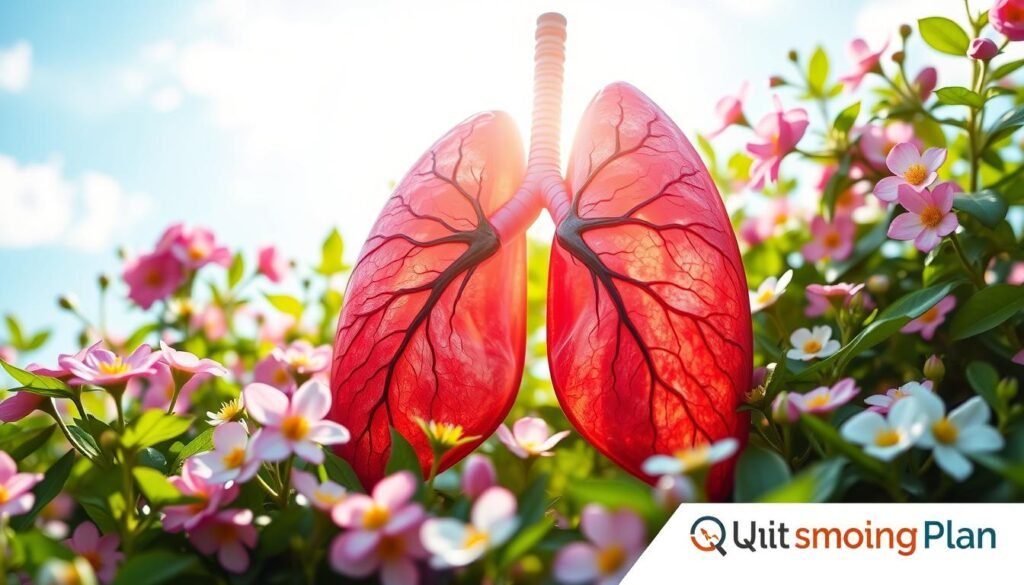
By making these lifestyle changes, you’re investing in a healthier future. Improving your lung health makes you more resilient against future respiratory problems28.
Lung Health Supplements Post Smoking Cessation
After quitting smoking, lung health supplements post smoking cessation can help a lot. They give you important vitamins and minerals to fight smoking damage. For example, quitting smoking can improve lung function in just a few weeks to months27. You might also breathe easier and cough less in the first year27.
Vitamins C and E are especially good for you. Smokers need more Vitamin E because it gets used up faster29. These vitamins help keep your lungs healthy.
Magnesium and omega-3 fatty acids also help. Magnesium can lower lung inflammation. Omega-3s support your breathing. Eating foods like blueberries and spinach can help fight inflammation27. Drinking lots of water also helps keep your lungs clear27.
Here’s a list of supplements that help your lungs:
| Supplement | Benefit |
|---|---|
| Vitamin C | Boosts immune function and helps combat oxidative stress. |
| Vitamin E | Provides antioxidant support, essential for lung protection. |
| Magnesium | Helps lower inflammation and supports lung function. |
| Omega-3 Fatty Acids | Improves lung function and reduces inflammation. |
| Zinc | May reduce the toxic effects of smoking and improve lung health. |
Adding these lung health supplements post smoking cessation to your life can make quitting easier. They help your lungs get better. Try to make these changes to improve your health.
The Importance of Regular Check-Ups for Lung Health
Regular check-ups are key to keeping your lungs healthy, especially after you stop smoking. They help doctors keep an eye on your lung health and catch problems early. This is why regular check-ups for lung health are so important. They help prevent serious issues before they start30.
People between 55 and 74 should get lung health checks. These tests help find lung cancer early, leading to better treatment31. Also, if your CT scans are clear, you should get checked every two years until you’re 7531. These tests can also spot other lung problems like COPD or bronchiectasis, giving a full picture of your lung health32.
By keeping an eye on your lung health, you learn a lot about your current state. You can also make smart choices about your lifestyle, like quitting smoking. Plus, staying active can boost your lung function and overall health at any age30. So, don’t skip these important tests. They’re a big step in protecting your lungs and keeping you healthy for the long term.

Understanding Respiratory Wellness After Quitting Smoking
Quitting smoking starts your journey to better lung health right away. It’s important to track your lung health journey. This includes monitoring your exercises, symptoms, and any improvements.
This proactive approach helps you stay committed to your lung health after quitting smoking.
Tracking and Monitoring Progress
Tracking your progress gives you insights into your lung health. Research shows that quitting smoking for 20 minutes can lower heart rate and blood pressure. It also improves circulation33.
Within 8 hours, nicotine and carbon monoxide levels in your blood drop significantly. This allows oxygen levels to return to normal33. The first few days after quitting, your lungs start to clear out mucus and debris. You may also experience withdrawal symptoms33.
Three days after quitting, breathing gets easier. Your lung capacity may also increase as pathways clear33. Studies show that avoiding smoking for a week makes quitting for good nine times more likely33.
By the two-week mark, lung function could improve by up to 30%. This makes breathing easier33.
As you keep tracking, note that improved dopamine function may start after three months of not smoking. This improves overall respiratory wellness34. However, some people may still have persistent coughing or shortness of breath even three months later34.
Understanding these stages helps you set achievable goals. Regularly documenting your journey boosts your sense of accomplishment. It strengthens your resolve to maintain better lung health.
Your commitment is key to achieving optimal respiratory health after quitting smoking. Remember, each small victory motivates you to keep moving toward a healthier future.
| Timeframe After Quitting | Observed Changes |
|---|---|
| 20 minutes | Heart rate and blood pressure drop, circulation improves. |
| 8 hours | Nicotine and carbon monoxide levels decrease; oxygen levels return to normal. |
| 3 days | Breathing may become easier as lung pathways clear. |
| 2 weeks | Lung function may improve by up to 30%. |
| 3 months | Improved dopamine function observed compared to when smoking. |
Supporting Others in Their Smoking Cessation Journey
Quitting smoking is tough, but your help can make a big difference. Research shows that people with good support are more likely to quit and stay smoke-free35. Over 53 million Americans have kicked the habit, proving it’s possible36.
Knowing why quitting is important can boost someone’s chances of success. They might feel irritable, have trouble sleeping, or feel anxious. Your support and encouragement are key, especially in the first week or two36.
- Encourage their efforts and celebrate each step, even if they slip up. Most people need to try several times to quit for good35.
- Help them find resources like 1-800-LUNGUSA for managing stress and cravings36.
- Remind them that cravings are short-lived and can be managed with strategies37.
- Introduce them to free clinics that offer counseling and medication to help them quit37.
As you support them, remember that quitting is not always linear. View each setback as a chance to learn and try again. Together, you can build resilience and celebrate every step towards a smoke-free life.

Conclusion
Quitting smoking is a game-changer for lung health. It cuts down health risks and boosts your life quality. Quitting smoking can add 10 years to your life and lower risks of heart disease and lung cancer38.
Your effort to stop smoking helps your lungs and overall health. It shows how quitting smoking is good for you.
To keep improving lung health, eat well and exercise often. These habits help your lungs recover better and stay healthy after quitting. A supportive environment helps you stay on track with lung wellness.
Knowing how quitting smoking helps your lungs is key. It stops lung health from getting worse and opens up a future without smoking’s problems39. Your lung health improvements show your dedication to a healthier life.
FAQ
How long does it take for my lungs to start recovering after I quit smoking?
What are the benefits of quitting smoking specifically for lung health?
How can I support my lung recovery after quitting smoking?
Does my age affect how quickly my lungs recover after quitting smoking?
What signs should I look for to know that my lung health is improving?
Are there specific nutrients that can help my lung recovery?
What are some effective detox strategies for my lungs after I quit smoking?
How often should I have check-ups to monitor my lung health after quitting?
How can I support someone who is trying to quit smoking?
Source Links
- https://www.cancer.org/cancer/risk-prevention/tobacco/guide-quitting-smoking/benefits-of-quitting-smoking-over-time.html
- https://www.lung.org/research/sotc/by-the-numbers/8-ways-your-health-improves-when-you-quit-smoking
- https://www.niquitin.co.uk/what-happens-lungs-after-quitting-smoking/
- https://www.solutionhealth.org/a-timeline-of-what-happens-after-you-quit-smoking/
- https://www.unitypoint.org/news-and-articles/holy-smoke-15-surprising-benefits-of-quitting-smoking
- https://www.check4cancer.com/advice-and-awareness/blog/1697-lung-recovery-after-smoking
- https://www.snhhealth.org/blog/november2024/a-timeline-of-what-happens-after-you-quit-smoking
- https://www.medicalnewstoday.com/articles/317956
- https://www.elliothospital.org/about-us/newsroom/news/what-happens-your-lungs-when-you-quit-smoking
- https://www.mayoclinic.org/healthy-lifestyle/quit-smoking/expert-answers/quit-smoking/faq-20057818
- https://www.news-medical.net/news/20200130/Quitting-smoking-reverses-lung-cell-damage-even-for-decade-long-smokers.aspx
- https://www.bbc.com/news/health-51279355
- https://www.physiology.org/detail/news/2021/03/23/quit-the-hookah!-lung-damage-inflammation-is-reversible-with-smoking-cessation
- https://pmc.ncbi.nlm.nih.gov/articles/PMC7261004/
- https://frisbiehospital.com/blog/entry/how-to-improve-lung-health-after-quitting-smoking
- https://www.orlandohealth.com/content-hub/how-the-lungs-heal-after-quitting-smoking/
- https://www.lompocvmc.com/blogs/2021/september/how-long-does-it-take-the-lungs-to-heal-after-qu/
- https://www.healthline.com/health/what-happens-when-you-quit-smoking
- https://pmc.ncbi.nlm.nih.gov/articles/PMC3927319/
- https://www.mountsinai.org/health-library/special-topic/benefits-of-quitting-tobacco
- https://www.medicalnewstoday.com/articles/324483
- https://www.nicorette.com/why-quit-smoking/reasons-to-quit/how-to-help-lungs-recover-after-quitting-smoking?srsltid=AfmBOorSehK1xmwhXA-svG8Sm1W3tGQ_QanxPMgObHE4F-1nV7OOUWYo
- https://pmc.ncbi.nlm.nih.gov/articles/PMC4765424/
- https://www.lung.org/lung-health-diseases/wellness/breathing-exercises
- https://www.verywellhealth.com/lung-detox-8551926
- https://www.webmd.com/lung/copd/features/lung-detox-facts
- https://www.healthline.com/health/quit-smoking/how-to-clean-lungs-after-quitting-smoking
- https://www.nicorette.com/why-quit-smoking/reasons-to-quit/how-to-help-lungs-recover-after-quitting-smoking?srsltid=AfmBOoo0bd3OOOvWx3hkwyBy-uFC_cyFU5SmFeR9Ute0CJ74Yr0MOS9P
- https://www.singlecare.com/blog/vitamins-for-smokers/
- https://www.lung.org/lung-health-diseases/wellness/protecting-your-lungs
- https://www.asthmaandlung.org.uk/symptoms-tests-treatments/tests/lung-health-checks
- https://www.cancerresearchuk.org/about-cancer/lung-cancer/getting-diagnosed/lung-health-checks
- https://www.inspirahealthnetwork.org/news/what-happens-inside-your-body-when-you-stop-smoking
- https://www.healthline.com/health/smoking/why-you-may-feel-worse-several-months-after-quitting-smoking
- https://www.cancer.org/cancer/risk-prevention/tobacco/guide-quitting-smoking/helping-a-smoker-quit.html
- https://www.lung.org/quit-smoking/help-someone-quit
- https://utswmed.org/cancer/support-services/education-resources/support-loved-one-quit-smoking/
- https://www.cdc.gov/tobacco/about/benefits-of-quitting.html
- https://pmc.ncbi.nlm.nih.gov/articles/PMC7729356/
